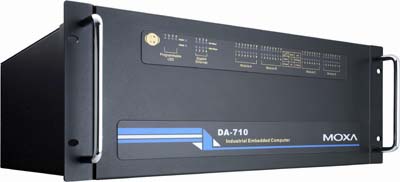Rackmount automation PC has four PCI slots
Feb 4, 2010 — by LinuxDevices Staff — from the LinuxDevices Archive — 1 viewsMoxa announced a rackmount automation computer, with four PCI expansion slots and four gigabit Ethernet ports. The DA-710 has a 2GHz Intel Celeron M processor, a CompactFlash slot, SATA and IDE interfaces, two serial ports, plus four USB 2.0 ports, and runs Debian Linux 5.0, says Moxa.
Moxa says its 4U-high rackmount computer is suitable for industrial automation applications, particularly those in power substations. A key to the system's capabilities is said to be its four PCI expansion slots, which accept optional modules including the following:
- An eight-port RS-232/422/485 module (available with isolation, DB9 or terminal block)
- A four-port 10/100 Mbps LAN module
- An eight-port RS-232/485 module
- An eight-port 10/100 switch module
- An eight-port RS-422/485 module
- A "universal" PCI expansion module
Even without these modules, the DA-710 (pictured below) provides a number of interfaces. For example, the system has four gigabit Ethernet interfaces with RJ45 connectors, four USB 2.0 ports, four digital I/Os, and two RS232 serial ports, according to the company.

The Moxa DA-710
The DA-710's tall case also is said to provide room for two SATA-150 interfaces and an IDE interface, presumably backed up by a hard disk bay to go with each, though this wasn't specified. In addition, Moxa says, the device has a CompactFlash slot and a bootable DOM (disk on module) available with Linux (1GB DOM required) or Windows Embedded Standard 2009 (2GB DOM) installations.
According to Moxa, the DA-710 has VGA and PS/2 ports on its rear panel. The front panel, meanwhile, is decked out with LEDs that show when power is on, display the status of as many as eight Ethernet ports, and may also be programmed to monitor the functionality of the modules listed above, when installed. A watchdog timer and alert buzzer are also included, says the company.

The Moxa DA-710's front and rear panels
(Click to enlarge)
Moxa says the DA-710 runs fanlessly, employing a 2GHz Intel Celeron M processor, GLE960 northbridge, and ICH8M southbridge. Power consumption is rated at just 60 Watts, lower than expected for such a mighty-looking box.
Specifications listed by Moxa for the DA-710 include:
- Processor — 2.0GHz Intel Celeron M
- Chipset — GLE960 northbridge and ICH8M southbridge
- Memory — Up to 2GB of DDR2 RAM via single SODIMM socket (1GB is already built in)
- Storage:
- DOM (disk on module); 1GB in Linux configuration, and 2GB in Windows Embedded Standard 2009 configuration
- 1 x IDE and 2 x SATA; details of drive bays unspecified
- Expansion:
- 4 x PCI slots
- 1 x CompactFlash slot
- Networking — 4 x gigabit Ethernet
- Other I/O:
- 1 x VGA
- 1 x PS/2
- 2 x RS232
- 4 x USB 2.0
- 4 x DIO
- Power requirements — 100 to 240VAC; 60 Watts
- Operating range — 14 to 122 deg. F (-10 to 50 deg. C)
- Dimensions:
- Without rackmount ears, 16.53 x 15.74 x 7.08 inches (420 x 400 x 180mm)
- With rackmount ears, 18.89 x 15.74 x 7.08 inches (480 x 400 x 180mm)
- Weight — 30.86 pounds (14kg)
The Linux distribution that ships with the DA-710 is based on Debian 5.0 and Linux 2.6.26-2, and uses the EXT2 file-system, says Moxa. Other features are said to include bash, busybox, login, telnet, ftp, ssh, openbsdinetd, apt, apt-utils, dpkg, grub, and udev. The distribution uses the GNU Make 3.8.1 utility and GNU C and C++ compilers. Other details about the distribution may be found in the datasheet, from the link below.
Availability
According to Moxa, the DA-710 is available with preinstalled Windows Embedded Standard 2009 or Linux. Pricing was not specified, but the device appears to be available now.
More information on the Moxa DA-710 may be found on the company's website, here.
This article was originally published on LinuxDevices.com and has been donated to the open source community by QuinStreet Inc. Please visit LinuxToday.com for up-to-date news and articles about Linux and open source.